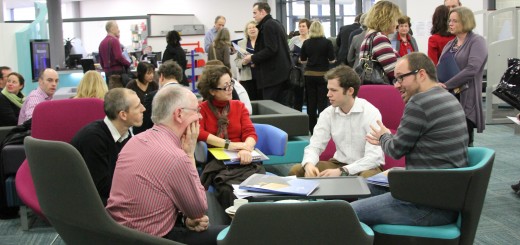Creative Lecture Capture, Webinars & Screencasting at #MELSIGUoN
I recently attended the latest Media Enhanced Learning Special Interest Group (MELSIG) event on ‘Creative Lecture Capture, Webinars & Screencasting’ at the University of Nottingham. The event investigated how live and recorded video is being used creatively in higher education to promote learner engagement. The event demonstrated how the Flipped Classroom, asynchronous access to rich content, and making technology more accessible to diverse producers, for example, is changing our learning and teaching landscape.
Recordings and presentations from the event can be found on the event webpage at http://melsig.shu.ac.uk/?page_id=715
Introduction
Andrew Middleton, Chair of MELSIG, introduced us to the event, and those who were new to it, to MELSIG…
Innovation at the University of Nottingham
Faculty Case Study – Dr Sally Chappell, Lecturer in Human Molecular Genetics, Faculty of Medicine & Health Sciences
Lecture Capture – Ian Pearshouse, Service Owner – Lecture Capture
Webinars: Inside and Outside the Institution – Helen Whitehead, Learning Technology Consultant
Innovation in the Region
Thinking Creatively with Video: MyCAT does not pussyfoot about – Bev Cole, Mark Hetherington, Dario Faniglione, Birmingham City University
Tackling the problem of simply adding lots of video to your bit of the VLE… for your students only… and possibly doing something more interesting, creative, shareable, interactive and engaging with them instead. The Centre for Enhancement of Learning and Teaching (CELT) at BCU will demonstrate their drag and drop solution for hard pressed staff that integrates both Kaltura (video streaming) and their learning repository!
Using lecture capture technologies to support peer-to-peer feedback among first-year Fashion students in a studio-based learning environment – Ann Draycott, Rob Higson, and Glenn McGarry, University of Derby
This session looks at how first-year Fashion students at the University of Derby have been using lecture capture technologies to provide each other with feedback on their designs and creations. This project forms part of a wider Institutional media-enhanced feedback pilot aimed at promoting and supporting, through staff development programmes, the exploration of audio and video feedback approaches across the University of Derby.
Emerging practice with webinars for blended and online learning – Calum Thomson (University of Salford) & Rod Cullen (Manchester Metropolitan University).
The use of webinars to support blended and online learning has increased slowly but surely at both MMU and University of Salford over the past two years. This has presented both opportunities and challenges to those colleagues who have taken the plunge. Calum and Rod have undertaken a series of one-to-one interviews with colleagues delivering webinars to explore their experiences and to try and identify emerging good practice with this exciting technology.
iTunesU Special Focus Panel
Presentations comparing their experience of leading the adoption of iTunesU at three institutions. The presentations each reflect on what has been done anmd by whom:
- How academics and students have responded
- How iTunesU has affected innovation in teaching and learning
Special Focus Parallel workshops
Workshop 1: Using Video to Capture Learning
Running Video Assessments – Ellie Kennedy and Helen Puntha, Nottingham Trent University
Student videos form the assessment for the online NTU Sustainability Certificate. Ellie and Helen will discuss how online video assessment works on the course and how videos made by last year’s course participants are being used to create sustainability-related materials for general teaching purposes. We continue to collate ideas on Padlet: http://padlet.com/amiddlet50/student-video
Exploring the value and use of recorded student presentations – Alex Spiers, Liverpool School of Tropical Medicine
LSTM have recently purchased a site wide licence for Panopto Lecture Capture software and provide all students at the school with an account. Students on the Clinical Challenges in Tropical Medicine course have to work in groups to create, present and record weekly presentations on specific topics using Panopto and Office 365 software. This case study will examine how the video recordings have been used as well as finding out student perceptions of the impact of these tools on their learning experience.
Workshop 2: Using video stories and scenarios for learning in the open – Chrissi Nerantzi, MMU.
The session will look at how videos were incorporated into the pedagogical design of the successful BYOD4L, an open cross-institutional CPD event, and how they were used. We will explore together how video stories and scenarios could be used in your own practice and what the potential benefits are.
Special Focus Parallel Workshops
The Good Practice Exchange – Eleanor Livermore, MMU
discusses creating film resources to promote good academic practice. Eleanor collects interviews with MMU staff about their teaching ideas and projects. http://www.celt.mmu.ac.uk/good_practice/
Get involved!!! Participatory bite-size CPD, cross-institutional examples from practice – Chrissi Nerantzi
Moving on from tutor provided screencast feedback to students producing formative reflective screencasts of their own – Rod Cullen, MMU
For several years I have been using screencasts to provide feedback on formative work on learning design that has a strong visual component. This has been overwhelmingly well received by my students primarily because they find this audio visual format engaging and understandable. I wondered if this might work in reverse and allow my students to explain their thinking and reflect upon their learning designs when they share them with me. I have been pleasantly surprised at how well this can work.
Screencasting for Postgraduate Assessment – Mel Lindley and Nicky Snowdon, Sheffield Hallam University
Post graduate students undertaking one of the distance learning modules within the MSc Advancing Physiotherapy Practice programme were given a choice of formats for their summative task. The majority of students chose to use screencasts to deliver a presentation. This session will discuss how students were supported in developing their submission, the experience of the module team of the marking process and explore issues of parity and student experience.
Being digitally rich, social and creative!
A round up from delegates on what they will take away from the day – 59 people say what they learnt!
MELSIG events are always very well organised and structured, and the content is always of a very high standard, we’re hoping to offer to host an event here at YSJ sometime soon! If you have any questions or comments about any of the presentations from the day then please use the comments section below, or contact TEL@yorksj.ac.uk.
Phil


